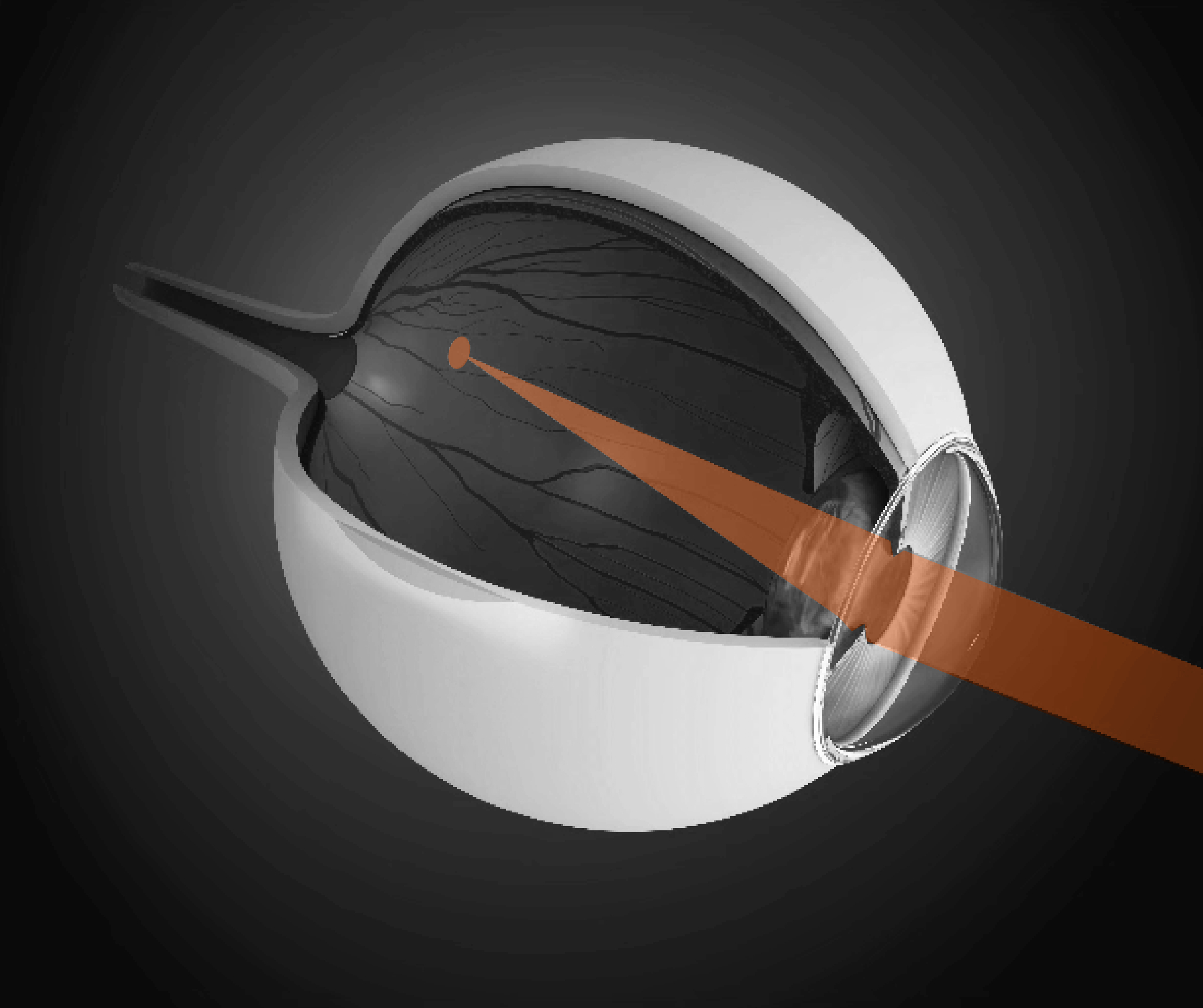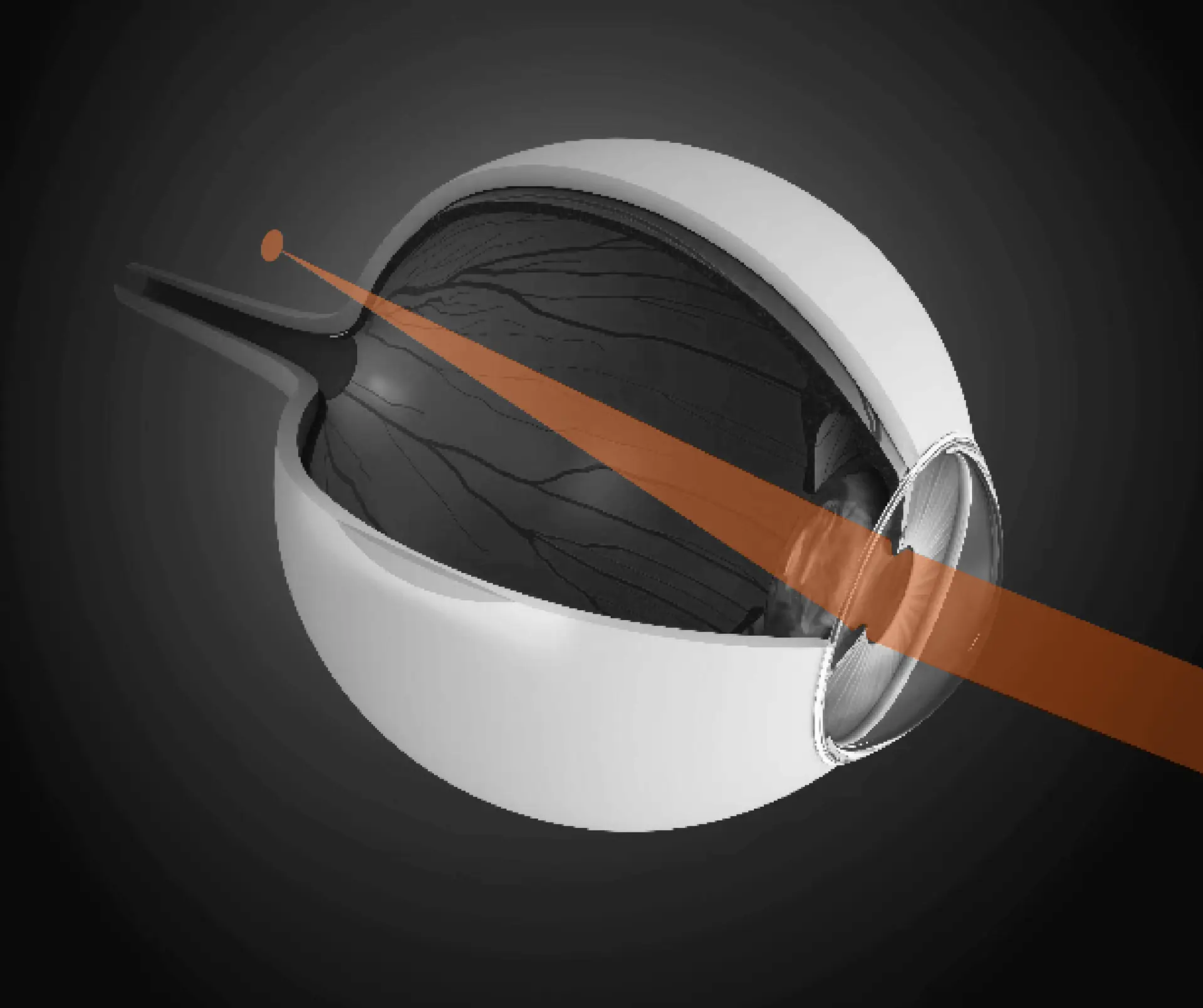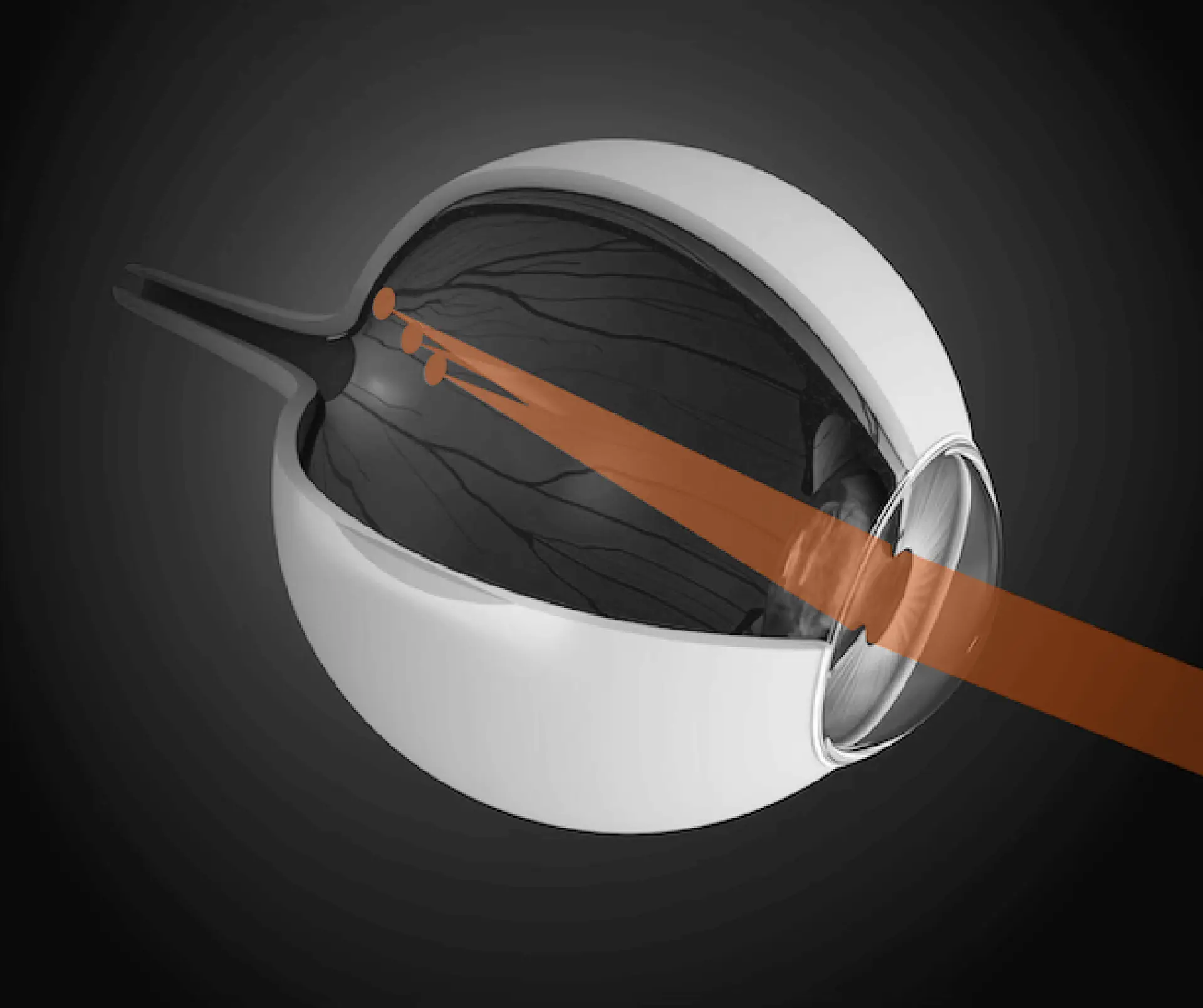Embrace getting older with clarity, comfort and confidence.
As we age, our natural lens loses its clarity and flexibility, resulting in blurred vision from cataracts or the need for reading glasses due to presbyopia. Today’s advanced lens procedures do more than just remove cataracts—they can also restore a fuller range of vision and reduce your dependency on glasses.
At Sandton Eye Clinic, we offer Refractive Cataract Surgery and Refractive Lens Exchange (RLE) for patients over 55 seeking more visual freedom and quality of life.
What’s the difference between Refractive Cataract Surgery & Refractive Lens Exchange (RLE)?
Although the procedures are very similar and both replace your natural lens with an artificial lens the indication for surgery differs. The table lists the main differences.
Refractive Cataract Surgery
- Purpose: Removes a cloudy (cataract) lens
- Ideal for: Patients with cataracts impacting their vision
- Medical Aid: Typically covered for mono-focal lenses
- Premium Lens Options: Yes – with out-of-pocket co-payment
- Main Benefit: Restores clear vision and may reduce dependence on glasses
Refractive Lens Exchange (RLE)
- Purpose: Replaces a clear but ageing lens
- Ideal for: Adults 50+ with presbyopia or refractive errors who want to reduce dependence on glasses
- Medical Aid: Not covered – considered elective refractive procedure
- Premium Lens Options: Yes – for maximum visual freedom
- Main Benefit: Proactive vision correction, for reduced dependence on glasses
Conditions these procedures can correct
A combination of these conditions can be addressed at the same time if specialised lenses are used:

Cataracts (clouded vision)

Presbyopia (Age-related vision changes)

Myopia (Nearsightedness)
Difficulty seeing distant objects

Hyperopia (Farsightedness)
Difficulty seeing close objects

Astigmatism
Blurry vision due to an irregularly shaped cornea
Lens Options at Sandton Eye Clinic
MONO-FOCAL
- Ideal for patients who do not mind wearing glasses and prefer minimal to no co-payment
- Single focus point will be 5/5 (either near or distance) Other focus point will be 1/5
- You will need glasses all the time
- These lenses are covered in full by most medical aids
- Night driving should not be difficult with minimum halo's
- You will only have clear vision for one distance
Extended Depth of Field
- Ideal for patients that want to have very good distance vision, but still want to be less dependent on glasses
- Near vision will be 2/5, intermediate vision 4/5 and far vision 5/5
- Provides clear distance vision and some intermediate vision. Glasses will be used for reading
- There will be a co-payment with most medical aids
- Some halos around lights
- Excellent distance vision. A good alternative for multi-focal lenses. Blended vision can improve intermediate and near vision
MULTI-FOCAL
- Ideal for patients that want to be spectacle independent most of the time
- Near and distance vision will be 4.5/5 with intermediate vision 4/5
- 90% do not wear glasses for any distance. Some patients wear readers for prolonged reading
- There will be a co-payment with most medical aids
- Visible halos reflected around light that might decrease with time
- There is a slight compromise in distance vision to provide unaided near and intermediate vision
Why Choose Sandton Eye Clinic for Cataract Surgery?
- Expert Refractive Surgeons: Internationally trained refractive and cataract surgeons, including Dr Coetzee and team.
- Advanced Technology: Precision diagnostics and computer-assisted surgery.
- Multifocal & Toric Options: Experience in implanting a wide range of lenses for patients seeking spectacle independence.
- Custom Vision Plans: Tailored to your lifestyle, visual goals and budget.
- Trusted Team: Compassionate care and clear communication.
- High Patient Satisfaction: Thousands of successful procedures and life-changing results.
Let Us Help You Take the Next Step
We’re here to guide you toward clearer vision and a life free from glasses.
Take the first step toward clear vision – Schedule your consultation now!
CATARACTS FAQs
Everything you need to know about refractive cataract surgery and refractive lens exchange (RLE).
Understanding the Procedure
What is Refractive Cataract Surgery?
Refractive Cataract Surgery removes a cloudy natural lens (cataract) and replaces it with an artificial intraocular lens (IOL).
The goal is not only to restore vision but also to reduce dependence on glasses by correcting refractive errors (e.g. astigmatism, near- or far-sightedness) at the same time.
What is Refractive Lens Exchange (RLE)?
RLE is a similar procedure to cataract surgery but is performed before a cataract has developed.
It is ideal for patients over 50 who have difficulty focusing on near objects (presbyopia) or who want long-term vision correction and freedom from reading glasses or bifocals. You will not need cataract surgery later in life.
Is Cataract Surgery safe and what is the success rate?
Cataract surgery is one of the most successful medical procedures performed globally, with a success rate exceeding 98%. Millions of people undergo this surgery every year to restore clear vision. In most cases, patients report significant improvement in visual clarity, contrast, and quality of life.
Cataract surgery is considered extremely safe. It is performed using advanced technology and fine-tuned techniques, often on an outpatient basis. Serious complications are rare and, if they do occur, are usually treatable with prompt medical attention.
How are these procedures different from LASIK?
LASIK reshapes the cornea to correct vision, while cataract surgery and RLE replace the eye’s internal lens. RLE and cataract surgery are better suited for patients aged 55+ or those with lens-related vision problems like cataracts or presbyopia.
Is RLE better than LASIK?
For patients over 55 with early lens changes, RLE is often preferred over LASIK, which only reshapes the cornea and does not treat age-related lens issues.
If you do have LASIK or presbyLASIK at this age it is possible that you may need a lens procedure as well soon after due to lens changes that comes with age. We always choose the procedure that will give you the best visual outcomes for the longest period possible. Your suitability depends on a full eye assessment.
Will I need another procedure?
Sometimes, after surgery the back of the lens capsule may become cloudy over time (20–50% of cases). This is not a cataract returning, but rather a common, treatable condition called posterior capsule opacification (PCO). It is corrected with a quick, painless YAG laser treatment done in the clinic (15 minutes, no downtime).
During refractive surgery when reduced spectacle dependence is the goal your surgeon aims for perfection. In about 10% of cases a laser vision correction may be suggested to improve the vision further after your multifocal lens implant.
For a small percentage of the patients that have astigmatism and need toric lenses, the lens may rotate in the days to weeks after surgery and require a repositioning in theatre. This is usually covered by your medical aid.
Can cataracts come back after surgery?
No, the cataract itself cannot return. However, about 20–50% of patients may develop posterior capsule opacification (PCO)—a common side effect that causes cloudy vision. It’s easily treated with a quick laser procedure called YAG capsulotomy.
Lens Options & Vision Results
Will I need glasses after surgery?
It depends on the lens you choose.
- Mono-focal lenses: Clear vision at one distance; glasses needed for reading or other distances. You can visit your optometrist for new glasses 6 weeks after cataract surgery.
- Multifocal or EDOF lenses: Designed to provide clear vision at multiple distances and reduce the need for glasses.
It is best to discuss the advantages, disadvantages and expected need for glasses with your refractive surgeon as these differ from lens to lens.
For most multifocal lenses around 90% of patients say that they do not need glasses at any distance. We recommend that you may need office glasses for prolonged reading or computer work as well as driving glasses.
What are the benefits and compromises of multifocal lenses?
Multifocal lenses offer a chance of being less dependent on glasses. However, some people may notice halos or glare around lights at night. The brain usually adapts to this over time.

Can astigmatism be corrected during surgery?
Yes. We offer toric lenses for astigmatism correction, or your surgeon may perform a limbal relaxing incision (LRI) to reshape the cornea.
What if I need glasses after choosing a premium lens?
Although 90% of patients achieve spectacle independence, a small number may still require glasses for certain tasks like night driving or prolonged reading. Enhancement options like LASIK may be offered where appropriate.
We recommend that you may need office glasses for prolonged reading or computer work as well as driving glasses.
How do I know which lens is right for me?
Your ophthalmologist will guide you based on your eye measurements, lifestyle needs, reading habits, and visual goals. We offer a tailored recommendation after a detailed consultation.
How long does the artificial lens last?
Intraocular lenses (IOLs) are designed to last a lifetime. They do not wear out, degrade, or need to be replaced under normal circumstances.
When Should I Have Cataract Surgery?
Do I need to wait until my vision is very poor before having cataract surgery?
No. Cataract surgery doesn’t need to be delayed until the lens is completely cloudy. The best time for surgery depends on how much the cataract affects your quality of life—such as your ability to read, drive, work, or enjoy hobbies—and your personal visual goals.
If you are considering multifocal lenses to be less dependent on glasses, refractive lens exchange can be done before the cataract affects your vison.
What is a cataract, and how does it affect vision?
A cataract forms when the eye’s natural lens becomes cloudy and stiff over time.
At birth, the lens is clear and flexible, allowing you to focus on objects at various distances. As we age, the lens gradually loses clarity and flexibility, causing:
- Blurry or hazy vision
- Glare or scatter from lights
- Faded colours
- Difficulty focusing, especially up close

Can glasses correct cataract-related vision changes?
In the early stages, glasses may help. But as the lens becomes more clouded, glasses become less effective. When visual changes can no longer be corrected with spectacles, surgery is often the best solution.
What if I want freedom from glasses—should I consider surgery earlier?
Yes. If you value spectacle independence and are suited for multifocal or extended depth of field lenses, you may benefit from earlier surgery—even if the cataract isn’t yet advanced.
These premium lenses can provide clear vision at multiple distances, helping you regain freedom in your daily activities.
Is the artificial lens as good as the one I was born with?
While today’s lenses are highly advanced, no lens implant yet matches the full performance of a young, natural lens. However, premium lenses offer excellent visual outcomes and are specifically selected to match your vision needs and lifestyle.
When is the right time for cataract surgery?
You should consider cataract surgery when:
- Your vision interferes with daily activities
- Glasses are no longer giving you clear vision
- You wish to reduce your dependence on glasses
- Your surgeon confirms you are medically suitable
Choosing surgery earlier—with the right lens—can help you achieve excellent outcomes, especially if you’re aiming for a more active, glasses-free lifestyle.
How do I know if I have cataracts?
Cataracts often develop slowly and gradually, which means many people may not notice the changes in their vision until they start interfering with daily activities. Regular eye exams from age 60 are important for early detection.
If you experience one or more of the following symptoms, it may be time to schedule an eye examination:
- Double Vision
Seeing two images of a single object, especially when looking with just one eye. - Blurry or Hazy Vision
Everything looks out of focus, like looking through a foggy window. - Increased Need for Light
You need brighter lighting to read, cook, or perform detailed tasks. - Night Vision Difficulties
Trouble seeing clearly in low light or while driving at night. - Dull or Yellowed Colours
Colours appear faded, washed out, or have a yellowish tint. - Light Sensitivity
Bright lights feel harsh or uncomfortable; glare from headlights or sunlight may bother you more than before.
These symptoms can indicate cataracts, but they may also point to other eye conditions. It’s important to see an optometrist or ophthalmologist for a comprehensive eye examination. Early diagnosis allows you to make informed decisions and explore the right time for treatment.
Procedure & Recovery
Is Cataract or RLE Surgery painful?
No. The eye is fully numbed with anaesthetic drops, and sedation ensures you’re comfortable. Most patients don’t remember the procedure at all.
How long does the procedure take and how long do I have to stay in hospital?
Each eye takes about 15–30 minutes. You’ll go home the same day.
When will my vision improve?
Most people notice an improvement within a few days. Your sharpest vision typically returns within 6–8 weeks as your eye heals and adjusts to the new lens.
Will I need to take time off work or driving?
Most daily tasks can be resumed within 1–2 days. You may return to driving once your surgeon confirms your vision is safe and legal for driving.
What can I expect after surgery?
- Immediately After Surgery: You’ll be given a prescription for eye drops and instructions on how to use them. Arrange for transportation home and plan for some quiet time to rest. An eye shield will be placed over your operated eye. Do not remove the eye shield. If cataract surgery is performed on only one eye at a time, you may note an imbalance in your vision until the second eye is operated.
- First Days Post-Surgery: It’s normal to feel itching or mild discomfort as your eye heals. It’s also important to protect your eyes from bright lights by wearing UV-protected sunglasses outdoors. Vision should improve within 10-14 days after your procedure.
- Weeks Following Surgery: The recovery trajectory varies, but six weeks is the average period for healing. Vision adjustments may continue over several months, with the most significant changes occurring within the first three to six months.
Remember, each eye and patient’s response to surgery is unique, so your experience may differ slightly. Always follow the specific instructions provided by your ophthalmologist to ensure the best possible results from your surgery.
What are the danger signs after cataract surgery?
Seek immediate medical attention if you experience any of the following after surgery:
- Persistent Eye Pain: Continuous discomfort that isn’t relieved by prescribed medication.
- Vision Changes: Any sudden decrease in vision, such as a “black curtain” effect or temporary vision loss in one or both eyes.
- Gastrointestinal Symptoms: Nausea, vomiting, or excessive coughing that arises post-surgery.
- Visual Disturbances: New flashes of light, an increase in floaters, or any abrupt loss of sight.
Remember: If you have any concerns or experience any of the above symptoms, do not hesitate to contact your healthcare provider immediately.
What should I avoid after surgery?
- Swimming: Avoid pools, hot tubs, and open water for at least one month.
- Dust and pollen: Protect your eyes from irritants.
- Rubbing your eyes: Never rub your healing eye. If needed, gently blot with a clean tissue.
- Makeup: Wait for your doctor’s approval—usually safe to resume after 2 days.
- Unclean environments: Keep your eyes protected from potential infections or injuries.
Can I fly after cataract surgery?
Yes. Flying is safe after surgery. Just remember: cabin air is dry, so pack your eye drops in your carry-on to stay comfortable during the flight.
The most important thing is to discuss your travel plans with your surgeon before surgery. It is essential to have an emergency plan to have access to your surgeon in case of complication after your procedure.
Additional Considerations
Can both eyes be operated on the same day?
Yes, this is called Immediate Sequential Bilateral Cataract Surgery. It may be suitable for some patients after thorough medical evaluation, especially those who wish to reduce recovery time. Treating both eyes together often reduces overall costs and minimises time away from work or daily activities.
For cataract surgery, some medical aids require that each eye is treated separately. In such cases, we follow their specific authorisation protocols and will assist you in planning accordingly.
What is Posterior Capsule Opacification (PCO)?
PCO is a common, painless side effect where the membrane behind the lens becomes cloudy over time. It can happen months or years after surgery and is easily treated with a YAG laser procedure in our rooms. It takes only 15 minutes, and you can resume normal activity immediately.
Is cataract surgery covered by medical aid?
What if I have other eye conditions like diabetes, AMD or glaucoma?
The success of cataract surgery can be influenced by the overall health of your eyes. Conditions affecting other parts of the eye can impact both the procedure’s outcome and the potential for complications. Understanding the health of your entire eye is essential for setting realistic expectations and achieving the best results.
Conditions That May Affect Cataract Surgery Results:
- Diabetic Eye Disease
- Glaucoma
- Age-Related Macular Degeneration (AMD):
- Corneal Diseases and Keratoconus
- Previous Eye Injuries
- Prolonged Medication Use: Like long-term steroids.
- Hereditary and Other Eye Conditions
Addressing these conditions may be a necessary step before considering cataract surgery to ensure the best possible visual results.









